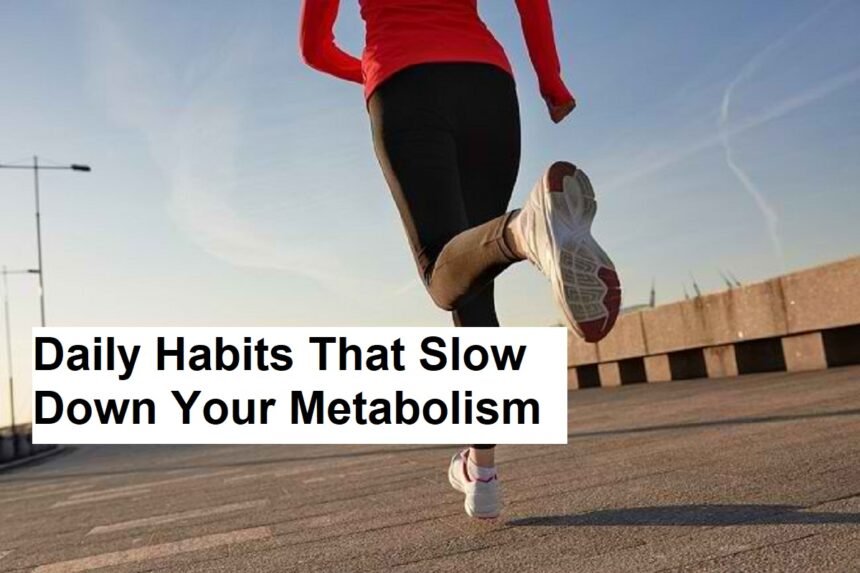Introduction
Do you feel tired more often, gain weight more easily, or notice that your body doesn’t burn energy like it used to? These could be signs that your metabolism is slowing down. While age and genetics play a role, many everyday habits can secretly make your metabolism sluggish. The good news? By recognizing these triggers, you can take steps to speed up your metabolism naturally.
In this article, we’ll explore the daily causes of a slowing metabolism and how to speed it back up, share doctors’ explanations on how to know when your metabolism is slowing down, and provide practical steps to boost it again.
What Exactly Is Metabolism?
Metabolism is your body’s process of converting food and drink into energy. It fuels everything you do—from breathing and sleeping to exercising and thinking. A faster metabolism helps you burn calories efficiently, while a slower metabolism makes it easier to gain weight and harder to feel energized.
Signs Your Metabolism Might Be Slowing
Doctors’ Explanation: How to Know If Your Metabolism Is Slowing Down
Doctors point out several indicators that suggest your metabolism isn’t working as fast as before:
- Unexplained weight gain even without changes in diet.
- Persistent fatigue despite enough sleep.
- Difficulty losing weight even with regular exercise.
- Cold sensitivity, since metabolism helps regulate body temperature.
- Digestive issues like constipation or bloating.
If these symptoms feel familiar, your metabolism may need a boost.
Common Daily Habits That Slow Down Metabolism
1. Skipping Breakfast or Long Fasting Without Balance
Many people think skipping meals saves calories, but it often slows metabolism. Without fuel, your body conserves energy instead of burning it.
2. Lack of Sleep
Poor sleep quality disrupts hormones like leptin and ghrelin, which control hunger and energy use. Doctors note that less than 7 hours of sleep regularly can significantly slow metabolic rate.
3. Sitting Too Much
A sedentary lifestyle weakens muscle activity, and since muscle burns more calories than fat, inactivity makes metabolism sluggish.
4. Eating Too Few Calories
Extreme dieting signals your body to conserve energy. Instead of burning fat, your body holds on to it, slowing metabolism even more.
5. Not Drinking Enough Water
Hydration is essential for digestion and calorie burning. Even mild dehydration can reduce metabolic efficiency.
6. Stress and High Cortisol
Chronic stress increases cortisol levels, which encourages fat storage (especially around the belly) and slows down metabolism.
Practical Steps to Boost Your Metabolism
1. Start Your Day With a Balanced Breakfast
A mix of protein, healthy fats, and fiber fuels your body and kickstarts calorie burning. Examples: eggs with avocado, or oatmeal with nuts and berries.
2. Prioritize Sleep
Aim for 7–9 hours of quality sleep each night. Create a bedtime routine—dim lights, avoid screens, and keep your room cool.
3. Move Throughout the Day
- Take standing breaks every hour.
- Add short walks after meals.
- Try resistance training—muscle mass boosts metabolism naturally.
4. Eat Enough (But Not Too Much)
Instead of starving yourself, focus on balanced meals that include lean proteins, whole grains, and vegetables. Small, regular meals can keep your metabolism steady.
5. Stay Hydrated
Drink water throughout the day. A glass of cold water before meals not only helps metabolism but also curbs unnecessary snacking.
6. Manage Stress Wisely
Practice breathing exercises, yoga, or mindfulness to lower cortisol. Stress management doesn’t just improve your mood—it also keeps your metabolism working properly.
Why Small Changes Matter
You don’t need extreme diets or intense workouts to revive your metabolism. Instead, consistent small changes—like drinking more water, getting enough sleep, and moving more—can make a big difference over time. Doctors emphasize that lifestyle habits, not quick fixes, are the real key to long-term metabolic health.
Final Thoughts
Your metabolism isn’t fixed—it responds to your daily habits. By recognizing the daily causes of a slowing metabolism and learning how to speed it back up, you can boost your energy, manage your weight, and feel healthier overall.
Your challenge: Try one of the practical tips above this week—whether it’s drinking more water, adding a 10-minute walk after lunch, or committing to better sleep—and share your experience with others. Small changes today can spark big results tomorrow.












